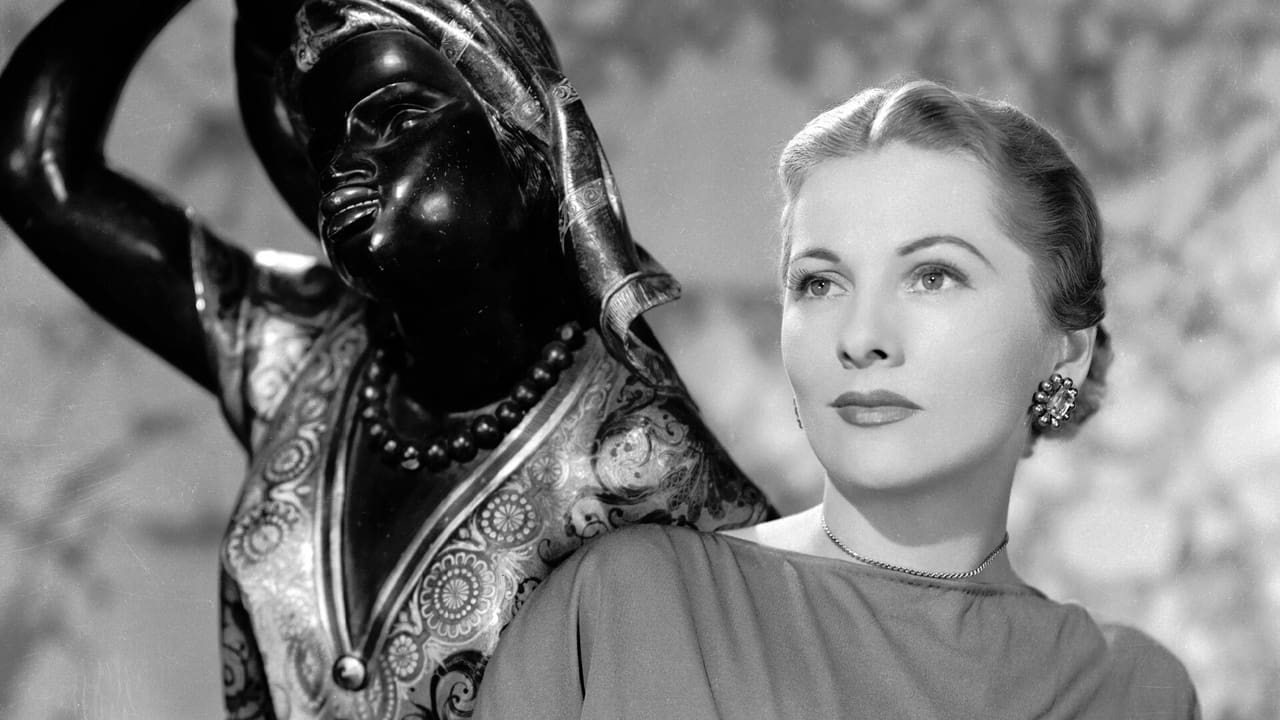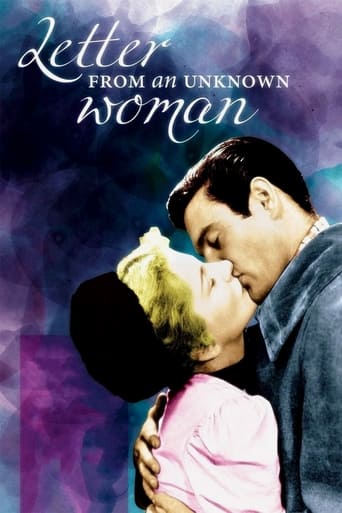RipDelight
This is a tender, generous movie that likes its characters and presents them as real people, full of flaws and strengths.
Iseerphia
All that we are seeing on the screen is happening with real people, real action sequences in the background, forcing the eye to watch as if we were there.
Payno
I think this is a new genre that they're all sort of working their way through it and haven't got all the kinks worked out yet but it's a genre that works for me.
Raymond Sierra
The film may be flawed, but its message is not.
John Brooks
This is one of those somewhat atmospheric romances that are based on just enough actual story and a fine enough depiction of the human mind that it just might interest the male viewer, in spite of the obviously feminine traits at work in this genre. Joan Fontaine, as good as ever in this role, symbolizes through her character the softer, more dependent aspect of the female entity. She's very sweet, cute, extremely discreet, almost ...'invisible' (*wink*wink*). Jourdain plays his role just about right as well, and it is very clearly established the relation between these two lead characters, and in their own right individually the side of the male and female avatars symbolized.All in all this is a film that holds up nicely for about the whole film; while it never really involves the viewer in a terribly emotional state, and there is a bit that is to be desired in the intensity as this film fairly flatly delivers the scenes from the original book. And if any part of the film stands for that criticism, it would be the very ending, something of a flat shortcoming, that leaves the viewer a little bit hungry for more, for something else; for a more expressive depiction of the ultimate moment of narrative.
gavin6942
A pianist about to flee from a duel receives a letter from a woman he cannot remember, who may hold the key to his downfall.What a very strange film. Although the title suggests the film is about a letter from an unknown woman, we spend most of the time following a woman and her love for a pianist. Is she connected to this letter? Is she the one dying in the hospital? And how is any of that related to the duel? Perhaps most strange is that although the film follows the original story very closely (from what I understand), it changes in one key instance: there is no duel in the original story, nor is there a character such as Johann. No duel? That is the big event lurking in the background of this entire story!
Sergeant_Tibbs
Max Olphus is a director who influenced many of my favourites including Stanley Kubrick, Wes Anderson and Paul Thomas Anderson. I like his personal manifesto on filmmaking in how it's an artform that has the unique aspect of a moving camera so he uses it frequently. As such, my first Ophuls film, Letter From An Unknown Woman is beautiful for its sweeping camera-work. It's so wonderfully rich and textured that it adds such bittersweet heartache to its tragedy. It's such bliss to just let it roll over you. Unfortunately, the characters it utilises are painfully bland. The only interesting thing about them is their interest in each other, otherwise they seem too picturesque and idyllic that they're difficult to believe as authentic people. The story is efficient but not particularly remarkable, excusable if the characters were strong enough. It's the one thing letting the film down because otherwise it would've easily been one of my favourites. Hopefully other Ophuls has more interesting character work.8/10
Dom Gulli
Letter from an Unknown Woman has the classic recipe for a romantic drama – the early stages of infatuation, the eventual realization of mutual feelings, and finally, heartbreak. However, the film uses this typical template in an over-the-top fashion to the point of making the film a dramatic clichéd romance flick.The level of Lisa's infatuation with Stefan at her early age is the understandable puppy love, school girl crush – which gives it the effect of being obsessive. Perhaps this is simply the difference between American and Viennese culture. However, her abandonment of her family at the train station simply to stay in Vienna, where Stefan resides, is pretty ridiculous. This was the point of the movie where I began to become restless, with the rest of the film becoming predictable – Lisa and Stefan finally get together, Stefan is a typical man whore and has a one night fling with Lisa, and promptly forgets about her. This plot is borrowed in modern movies left and right, and personally, while this film was created long before today's modern films, it's a cornerstone (and I use this term sardonically) that writers can't seem to shake.The "twist" so to speak, when Lisa and Stefan cross paths at the opera, provides for a break in the stagnancy and predictability in the plot. Lisa, who is married, decides to go home with Stefan, despite that she fears he forgets who she is. This is indeed the case; Stefan uses the same "lines" on Lisa during their tryst as he did during their first encounter. Lisa recognizes this and slips out of his apartment, leaving Stefan confused as to why what seemed to be a sure thing had disappeared in front of him. The cliffhanger ending was somewhat flat, because either outcome wasn't very interesting – either Stefan lived, or he allowed himself to be killed in what was presumably a duel with Lisa's husband. Once again, the film provides a cliché and not a very stimulating one at that.Overall, I found the clichés tiresome and the film, for me, dragged on. Perhaps it is that I have seen modern films that have similar romantic plots, complete with the "unexpected twist" at the end. However, because the film was released in 1948, it was something fresh – at least on the silver screen.If it was unclear, I personally did not enjoy this film, but I can appreciate the culture of Vienna at the time that is portrayed throughout. References to the opera, and especially the music of the time, were some of the components that shined through what I thought to be otherwise a very dull 87 minutes.

